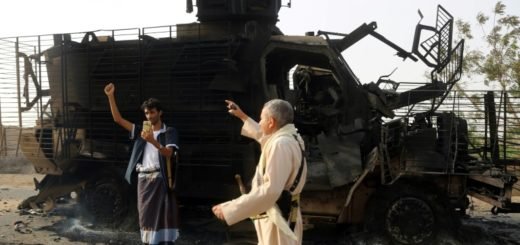Cleric Sadr wins Iraq poll but forming government far off
Final results from Iraq’s election confirmed today that an alliance spearheaded by populist cleric Moqtada Sadr has triumphed, but the fiery preacher faces a huge task to form a governing coalition.
Sadr’s Marching Towards Reform bloc won 54 of the 329 seats in parliament in a major upset at a May 12 vote that saw a record level of abstentions as Iraqis turned their back on a widely reviled elite.
The nationalist — whose Shiite militia battled US troops after the 2003 invasion — faces a deeply fragmented political landscape and opposition from key player Iran after he called for foreign influence in Iraq to be cut.

Moqtada al-Sadr Iraqi Shiite cleric and leader Moqtada al-Sadr (C-R) puts his ballot through an electronic counting machine into a ballot box at a poll station in the central holy city of Najaf on May 12, 2018 as the country votes in the first parliamentary election since declaring victory over the Islamic State (IS) group. Polling stations opened at 7:00 am for the roughly 24.5 million registered voters to cast their ballots across the conflict-scarred nation, AFP
Sadr, who has reinvented himself as an anti-corruption crusader in an alliance with secular leftists, is looking to be the kingmaker and oversee the formation of a cross-sectarian, technocrat government from some dozen parties.
But negotiations — which tentatively began after the vote — look set to drag out and it remains far from certain that Sadr’s group will claim power after the first vote since the defeat of the Islamic State group.
Poised in second place with some 47 seats is the pro-Iranian Conquest Alliance made up of ex-fighters from mainly Shiite paramilitary units that battled IS.
The Victory Alliance bloc of Prime Minister Haider al-Abadi, who hoped voters would reward him for seeing off the jihadists, performed worse than expected and was back in third place on 42 seats.
Sadr declared on Twitter that the results showed “reform has won and corruption is weakened,” but he faces a tricky regional context as he begins coalition negotiations.
Writing in The Washington Post Friday, premier Abadi insisted his government would do “all it can to ensure that the transition to the next government is conducted in a stable and transparent manner”.
He called for “dialogue” to create a new government that “must be demonstrably non-elitist (and) representative of the people rather than dominated by one side or denomination”.
Abadi — who came to power in 2014 as IS rampaged across Iraq — has balanced off rivals the US and Iran and could still remain in position as a consensus candidate.
The protracted horse-trading comes at a time of high tensions after Washington’s withdrawal from a landmark nuclear deal with Tehran and fears of a tug-of-war over Iraq.
Even before Sadr’s victory was confirmed, Iran had already been convening meetings to try to block him from forming a government.
Iran dispatched the powerful general Qassem Soleimani to Baghdad, who has met with several members of Iraq’s old guard including Abadi and his predecessor Nuri al-Maliki.
According to officials, Soleimani has ruled out any alliance with Sadr, who surprised many last years by visiting Iran’s regional foe Saudi Arabia as Riyadh seeks increased involvement in Iraq.
Soleimani’s shuttle diplomacy is aimed at gathering enough parties opposed to Sadr to deny his alliance a governable majority and a route to the powerful position of the prime minister — though Sadr himself says he is not in the running for the top job.
The US, which still has thousands of troops in Iraq from the fight against IS, is also looking to push its interests after the vote.
Washington envoy Brett McGurk has been meeting with leading politicians in both Baghdad and the autonomous Kurdistan region to the north.
Attracting the Kurds and the marginalized Sunni community will prove important for anyone seeking to come to power, as Iraq looks to carry out the mammoth task of rebuilding after the defeat of IS.
Sadr “will probably try to form a large coalition, including Shiite parties, potentially involving the list of Abadi, and the Sunnis and Kurds”, said Raphaele Auberty, an analyst at London-based BMI research.
PTI
Irfan Ansari The Kootneeti Team - Middle East Monitor



















